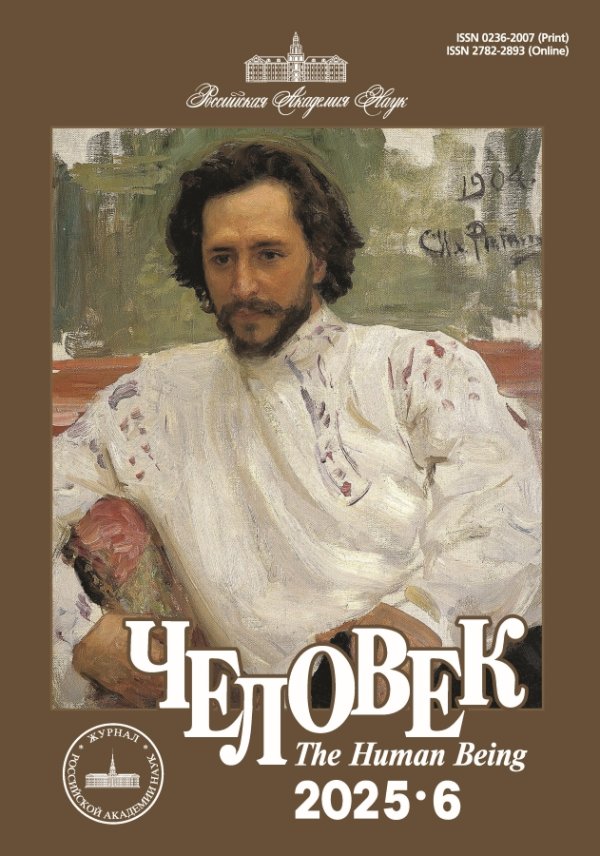Subject in Bioethics: Individual and Collective
- Authors: Belyaletdinov R.R.1
-
Affiliations:
- Institute of Philosophy, RAS
- Issue: Vol 36, No 3 (2025)
- Pages: 144-162
- Section: Social practices
- URL: https://medbiosci.ru/0236-2007/article/view/312676
- DOI: https://doi.org/10.31857/S0236200725030103
- ID: 312676
Abstract
The problem of collective and individual subjectivity in bioethics is examined. Although full recognition of the subject in bioethics occurs through a commitment to self-determination already at the beginning of the 20th century, it cannot be said that the creation of bioethical subjectivity can be considered complete. The purpose of the study is to analyze the opposition between the collective and individual subject in bioethics. To solve this problem, the genesis of the concept of subjectivity in bioethics and its adaptation to modern biomedical technologies are considered. Traditionally in the medicine the subject was appropriated to both physical and intellectual manipulations under the guarantee of the doctor’s virtuous intention. The recognition of the distinction between autonomy and the benevolent intention to restoring health occurs as a result of the increasing importance of subjectivity, which changes the very content of medicine from the virtue of providing assistance and saving human life to the recognition of an active subject who independently determines his own good, using critical thinking and personal experience. The assumption is substantiated that the subjective approach based on autonomy (self-determination) can be considered in two modes — as critical, based on reflection, and trusting, based on following and empathizing with collective values that receive representation in the collective subject, as well as on the distinction between the concepts of autonomy and freedom in bioethics. Collective and individual subjectivities are structurally rather related, through opposites, since they use authentication as a way of procedurally organizing action. The individual subject always retains substantivist autonomy, which allows him to build and reconfigure collective forms of autonomy, using his innate freedom. The stability of collective subjectivity is based on trust and empathy; without these conditions, collective subjectivity disintegrates. The distinction between freedom and autonomy in modern bioethics allows us to describe the subject simultaneously as a collective and individual actor.
Keywords
About the authors
R. R. Belyaletdinov
Institute of Philosophy, RAS
Author for correspondence.
Email: roman_rb@mail.ru
Russian Federation, 109240 Moscow, Goncharnaia St., 12, bldg. 1
References
- Вархотов Т.А., Аласания К.Ю., Брызгалина Е.В. и др. Технонаука и этос ученого: Контуры этики биобанкинга глазами российского научного сообщества (по результатам опроса специалистов в области биомедицины и смежных видов деятельности) // ΠΡΑΞΗΜΑ. 2018. Т. 18, № 4. С. 61–83.
- Varhotov T.A., Alasania K.Yu., Bryzgalina E.V. et al. Tekhnonauka i etos uchenogo: Kontury etiki biobankinga glazami rossiiskogo nauchnogo soobshchestva (po rezul’tatam oprosa spetsialistov v oblasti biomeditsiny i smezhnyh vidov deyatel’nosti [Technoscience and Ethos of a Scientist: Contours of the Ethics of Biobanking As Seen by the Russian Scientific Community (Based on a Survey of Experts in the Field of Biomedicine and Related Activities)]. ΠΡΑΞΗΜΑ. 2018. Vol. 18, N 4. P. 61–83.
- Вересаев В. Записки врача. СПб.: Типография А.Е. Колпинскаго, 1902.
- Veresaev V. Zapiski vracha [Doctor’s Notes]. St. Petersburg: Tipografiya A.E. Kolpinskago Publ., 1902.
- Колесников А.С., Ставцев С.Н. Формы субъективности в философской культуре XX века. СПб.: Санкт-Петерб. филос. о-во, 2000.
- Kolesnikov A.S., Stavtsev S.N. Formy sub”ektivnosti v filosofskoi kul’ture XX veka [Forms of Subjectivity in the Philosophical Culture of the 20th Century]. St. Petersburg: St. Petersburg Philosophical Society Publ., 2000.
- Лекторский В.А. Субъект, объект, познание. М.: Наука, 1980. С. 272–291.
- Lektorskii V.A. Sub”ekt, ob”ekt, poznanie [Subject, Object, Cognition]. Moscow: Nauka Publ., 1980. P. 272–291.
- Мы и биоэтика. Реплика А.В. Сапегиной // Человек. 1991а. № 1. С. 74.
- My i bioetika. Replika A.V. Sapeginoi [We and Bioethics. Reply by A.V. Sapegina]. Chelovek. 1991а. N 1. P. 74.
- Мы и биоэтика. Реплика П.Д. Тищенко // Человек. 1991б. № 1. С. 76.
- My i bioetika. Replika P.D. Tishchenko [We and Bioethics. Reply by P.D. Tishchenko]. Chelovek. 1991b. N 1. P. 76.
- Пружинин Б.И., Ветров В.А. Экспертиза как форма развития науки: фундаментальное vs прикладное // Вестн. Санкт-Петерб. ун-та. Философия и конфликтология. 2022. Т. 38, № 4. С. 534–546.
- Pruzhinin B.I., Vetrov V.A. Ekspertiza kak forma razvitiya nauki: fundamental'noe vs prikladnoe [Expertise As a Form of Science Development: Fundamental vs Applied]. Vestnik Sankt-Peterburgskogo universiteta. Filosofiya i konfliktologiya. 2022. Vol. 38, N 4. P. 534–546.
- Толстой Л.Н. Смерть Ивана Ильича // Толстой Л.Н. После бала. Смерть Ивана Ильича. Крейцерова соната. Отец Сергий. М.: Юрайт, 2020. С. 16–67.
- Tolstoi L.N. Smert' Ivana Il'icha [Death of Ivan Ilyich]. Tolstoi L.N. Posle bala. Smert’ Ivana Il’icha. Kreitserova sonata. Otets Sergii [After the Ball. Death of Ivan Ilyich. Kreutzer Sonata. Father Sergius]. Moscow: Yurait Publ., 2020. P. 16–67.
- Юдин Б.Г. Проблема конструирования человека // Вестн. Междунар. акад. наук. Рус. секция. 2008. № 1. С. 6–10.
- Yudin B.G. Problema konstruirovaniya cheloveka [The Problem of Designing of a Person]. Vestnik Mezhdunarodnoi akademii nauk. Russkaya sektsiya. 2008. N 1. P. 6–10.
- Asscher E.C.A., Vathorst S. van de. First Prosecution of a Dutch Doctor Since the Euthanasia Act of 2002: What Does the Verdict Mean? Journal of Medical Ethics. 2020. Vol. 46. P. 71–75.
- Baker R. Before Bioethics: A History of American Medical Ethics from the Colonial Period to the Bioethics Revolution. Oxford: Oxford University Press, 2013.
- Beier K., Jordan I., Wiesemann C., Schicktanz S. Understanding Collective Agency in Bioethics. Medicine, Health Care and Philosophy. 2016. Vol. 19. P. 411–422.
- Botkin J.R. Protecting the Privacy of Family Members in Survey and Pedigree Research. Jama. 2001. Vol. 285, N 2. P. 207–211.
- Cohen S. The Logic of the Interaction Between Beneficence and Respect for Autonomy. Medicine, Health Care and Philosophy. 2019. Vol. 22. P. 297–304.
- Dworkin G. The Theory and Practice of Autonomy. Cambridge University Press: 1988.
- Englehardt H.T.Jr. Basic Ethical Principles in the Conduct of Biomedical and Behavioral Research Involving Human Subjects. The Belmont Report: Ethical Principles and Guidelines for Protection of Human Subjects Research. Washington DC, National Commission for the Protection of Human Subjects of Biomedical and Behavioral Research. 1978. Appendix, Vol. 1. P. 8–2.
- Faden R.R., Beauchamp T.L. A History and Theory of Informed Consent. New York: Oxford University Press, 1986. P. 64–74.
- Garrison N.A. Genomic Justice for Native Americans: Impact of the Havasupai Case on Genetic Research. Science, Technology, & Human Values. 2013. Vol. 38, N 2. P. 201–223.
- Harris J. Scientific Research Is a Moral Duty. Journal of Medical Ethics. 2005. Vol. 31. P. 242–248.
- Häyry M. What Do You Think of Philosophical Bioethics? Cambridge Quarterly of Healthcare Ethics. 2015. Vol. 24, N 2. P. 139–148.
- Macklin R. Covid-19: A View from New York. Indian Journal Medical Ethics. 2020. Vol. 5, N 2. Р. 95–98.
- Mezinska S., Kaleja J., Mileiko I. Becoming and Being a Biobank Donor: The Role of Relationships and Ethics. Plos One. 2020. Vol. 15, N 11. P. 1–14.
- Palazzani L. The Pandemic and the Ethical Dilemma of Limited Resources: Who to Treat? Bioethics Update. 2020. Vol. 6, N 2. P. 67–79.
- Rakić V., Wiseman H. Different Games of Moral Bioenhancement. Bioethics. 2018. Vol. 32, N 2. P. 103–110.
- Savulescu J., Persson I., Wilkinson D. Utilitarianism and the Pandemic. Bioethics. 2020. Vol. 34, N 6. P. 620–632.
- Savulescu J., Persson I. Unfit for the Future: The Need for Moral Enhancement. Oxford: Oxford University Press, 2012.
- Ursin L.Ø. Personal Autonomy and Informed Consent. Medicine, Health Care and Philosophy. 2009. Vol. 12. P. 17–24.
- Ursin L., Ytterhus B., Christensen E., Skolbekken J.-A. “If You Give Your Little Finger, They’ll Tear off Your Entire Arm”: Losing Trust in Biobank Research. Medicine, Health Care and Philosophy. 2020. Vol. 23, N 4. P. 565–576.










